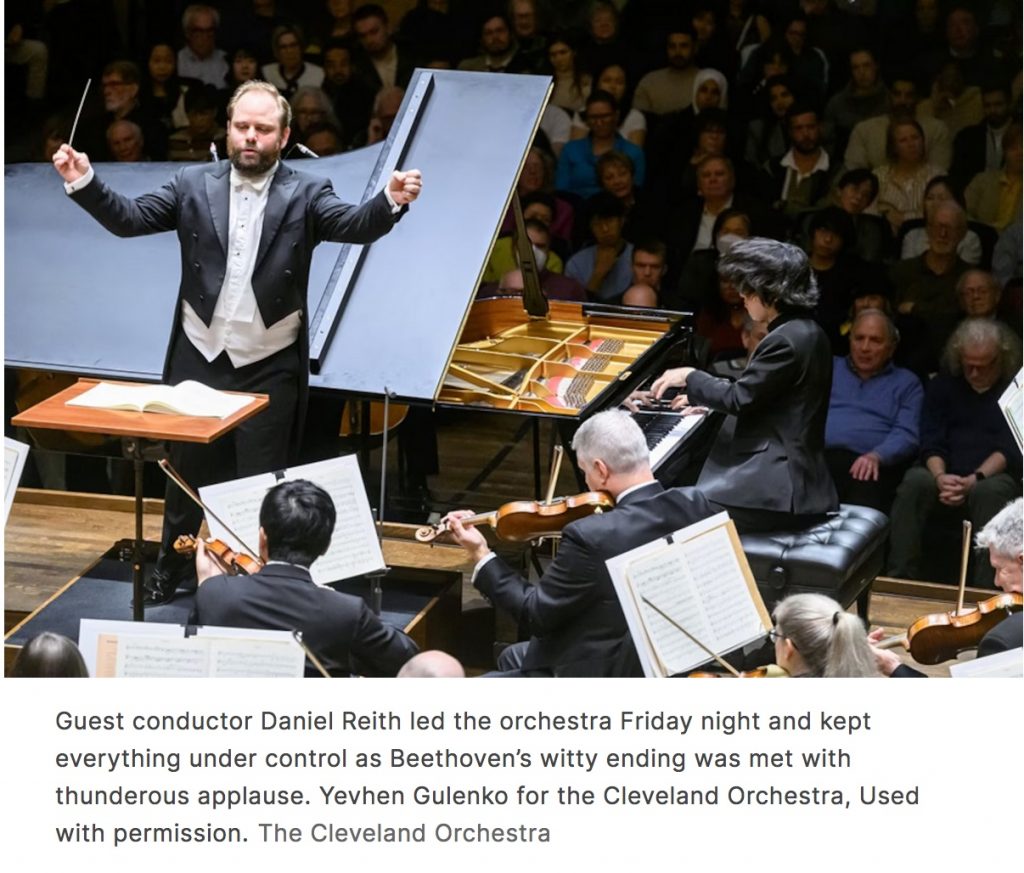
By Daniel Hathaway
CLEVELAND, Ohio — For the third program in The Cleveland Orchestra’s Beethoven Piano Concerto Cycle, the pairing of 20-year-old Korean pianist Yunchan Lim with his mentor Minsoo Sohn was an astute programming decision.
Well-established names on the concert circuit — Orion Weiss, Sir Stephen Hough, and Garrick Ohlsson — had already filled the empty solo spots for the composer’s Triple Concerto and solo concertos 2, 3, and 4. But the choice of the youngest pianist ever to win the Van Cliburn Competition to close out the Cleveland series packed Mandel Concert Hall at Severance Music Center on Friday evening, November 15, with a near-capacity audience teeming with enthusiastic young people.
Lim established a fan base in Northeast Ohio in 2018, when he won second place and the Chopin Prize in the Junior Division of the Cleveland International Piano Competition for Young Artists in June, then took third place and the Audience Prize in the Thomas and Evon Cooper Competition in July. Four years later, he captured the Cliburn gold medal in Fort Worth along with a cash prize of $100,000.
And in addition to a string of solo appearances with top-tier orchestras, last month Lim was named Gramophone Young Artist of the Year for 2024.
On Friday, works from two different periods in Beethoven’s career shared the Mandel Hall stage. The elder pianist, Minsoo Sohn, played the First Concerto, which the composer wrote for himself between 1795 and 1797 when he was in his mid-20s. The younger pianist’s assignment was the Fifth Concerto, which Beethoven penned at the age of 39, and not for himself to play.
This theoretically paired a mature composition performed by a young pianist still at the beginning of his professional career with an early concerto performed by a seasoned artist who has made his peace with arresting keyboard effects and can focus his concentration more on plumbing the depths of the music.
At the beginning of the Fifth Concerto, conductor Daniel Reith set a grand opening tempo that allowed the music room to sing. Lim responded with exquisite mood and color changes and dynamic contrasts.
Beautiful, unblemished descending passages adorned the slow movement’s simple, touching melody that let Beethoven speak for himself, and calm serenity suffused surrounded the music that foreshadowed the third movement Rondo.
That finale was full of bravado, many moods, and a treasure chest of colors. Lim’s sense of direction with the musical line invited you into his world and held you captive. In the Orchestra, the strings were lush, the winds elegant, and the brass tasteful.
Although the young pianist has a tendency to allow phrases to grow too big too quickly, he kept the heat in check, pulling back to produce captivating pianissimos that sparkled in the hall.
The evening began with the First Concerto. Reith set a brisk tempo in the opening Allegro and Sohn responded with a bright, sometimes overpowering tone, but showed a solid sense of phrasing.
Soloist and Orchestra sustained a beautiful musical partnership in the Largo, featuring warm strings and lyrical clarinets and bassoons.
The pianist set a swift tempo that never wavered through the series of jovial variations in the Rondo. Reith kept everything under control and Beethoven’s witty ending was met with thunderous applause.
Daniel Hathaway is founder and editor of the online journal ClevelandClassical.com. He teaches music journalism at Oberlin College and Conservatory of Music.
Published on ClevelandClassical.com November 21, 2024.
Click here for a printable copy of this article



